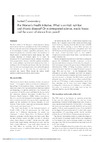Please use this identifier to cite or link to this item:
https://accedacris.ulpgc.es/jspui/handle/10553/76762
| Title: | The Women's Health Initiative. What is on trial: nutrition and chronic disease? Or misinterpreted science, media havoc and the sound of silence from peers? | Authors: | Yngve, Agneta Hambraeus, Leif Lissner, Lauren Serra Majem, Luis Vaz de Almeida, María Daniela Berg, Christina Hughes, Roger Cannon, Geoffrey Thorsdottir, Inga Kearney, John Gustafsson, Jan-Å Rafter, Joseph Elmadfa, Lbrahim Kennedy, Nick |
UNESCO Clasification: | 3206 Ciencias de la nutrición | Keywords: | Dietary Modification Trial Breast-Cancer Fat Pattern Risk |
Issue Date: | 2006 | Journal: | Public Health Nutrition | Abstract: | The first results of the Women's Health Initiative dietary intervention trial were published in the USA in February. This is a colossal intervention designed to see if diets lower in fat and higher in fruits, vegetables and grains than is usual in high-income countries reduce the incidence of breast cancer, colorectal cancer, heart disease and other chronic diseases, in women aged 50 - 79 years. As interpreted by US government media releases, the results were unimpressive. As interpreted by a global media blitz, the results indicate that food and nutrition has little or nothing to do with health and disease. But the trial was in key respects not reaching its aims, was methodologically controversial, and in any case has not produced the reported null results. What should the public health nutrition profession do about such messes? Los primeros resultados del ensayo de intervención dietética Women's Health Initiative se publicaron en EE. UU. En febrero. Esta es una intervención colosal diseñada para ver si las dietas más bajas en grasas y más altas en frutas, verduras y granos de lo habitual en los países de altos ingresos reducen la incidencia de cáncer de mama, cáncer colorrectal, enfermedades cardíacas y otras enfermedades crónicas en mujeres de 50 años. –79 años. Según lo interpretado por los comunicados de prensa del gobierno de EE. UU., Los resultados no fueron impresionantes. Según lo interpretado por un bombardeo mediático global, los resultados indican que la alimentación y la nutrición tienen poco o nada que ver con la salud y la enfermedad. Pero, en aspectos clave, el juicio no alcanzó sus objetivos, fue metodológicamente controvertido y, en cualquier caso, no ha producido los resultados nulos informados. ¿Qué debería hacer la profesión de nutrición de salud pública ante tales líos? |
URI: | https://accedacris.ulpgc.es/handle/10553/76762 | ISSN: | 1368-9800 | DOI: | 10.1079/PHN2006952 | Source: | Public Health Nutrition [ISSN 1368-9800], v. 9 (2), p. 269-272, 2006 |
| Appears in Collections: | Artículos |
SCOPUSTM
Citations
25
checked on Jun 8, 2025
WEB OF SCIENCETM
Citations
21
checked on Feb 22, 2026
Page view(s)
61
checked on Jan 10, 2026
Download(s)
69
checked on Jan 10, 2026
Google ScholarTM
Check
Altmetric
Share
Export metadata
Items in accedaCRIS are protected by copyright, with all rights reserved, unless otherwise indicated.
